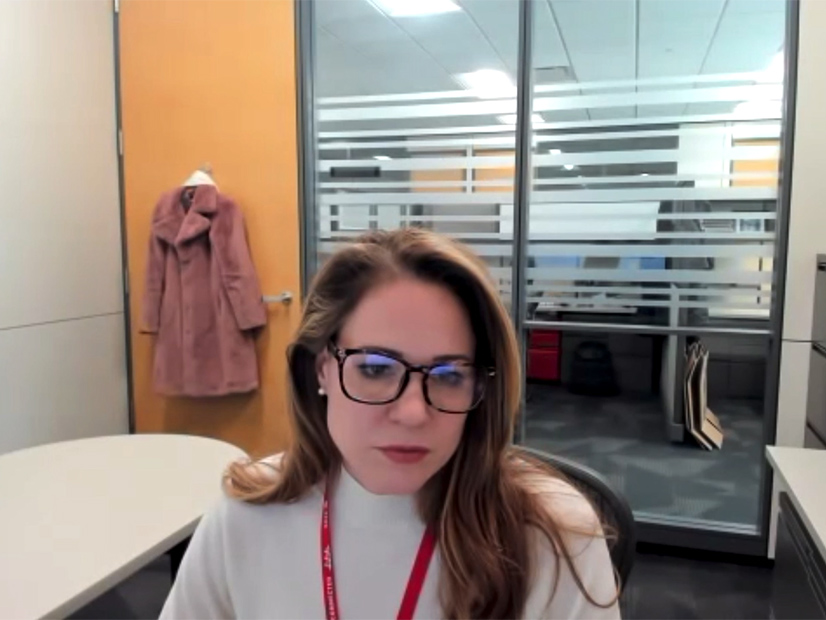In a sign of the urgency with which members view NERC’s latest cold weather standards development project, NERC’s Standards Committee voted Wednesday to give its executive committee the power to approve the project’s next steps.
The discussion on Project 2021-07 (Extreme cold weather grid operations, preparedness and coordination) garnered the most attention of any item at the committee’s truncated monthly meeting. Members agreed to delegate to the Standards Committee Executive Committee (SCEC) authority to accept the revised standard authorization request (SAR) for the project when the SAR drafting team finishes it, and to appoint the SAR drafting team as the project’s standard drafting team (SDT).
Under normal circumstances, these actions are undertaken by the full committee at its regular meetings, the next of which is scheduled for March 23. NERC Manager of Standards Development Latrice Harkness told the committee that SAR drafting team members expect to finish revising the SAR before that meeting, and “due to the time-sensitive nature of the project,” they wanted to move on to drafting the standard as quickly as possible and “build on the momentum and discussions” from previous meetings.
“It may not seem much, but this action would give the team several additional weeks that … they would not otherwise have, to have these robust conversations on the best path forward and how to best put pen to paper for this project,” Harkness said.
Work on Project 2021-07 has proceeded quickly since the Standards Committee approved the draft SAR at its November meeting. (See NERC Standards Committee Agrees to New Cold Weather Project.) After being seated at the committee’s January meeting, the SAR drafting team met multiple times a week in late January and early February as it considered industry comments on the draft SAR.
NERC initiated the project to carry out the recommendations of its joint inquiry with FERC into last February’s winter storms that knocked thousands of megawatts of capacity offline in Texas and left households across the state without power for days. (See FERC, NERC Release Final Texas Storm Report.) Among the report’s proposals were requiring generator owners and operators to identify and protect cold weather-critical components, build or retrofit generating units to operate to specific ambient temperatures and weather, and perform annual training on winterization plans.
The project team’s quick pace of work is also, in part, a response to prodding from NERC’s Board of Trustees, which at its November meeting expressed frustration at the Standards Committee over the project. (See “Frustration at Cold Weather Delay,” NERC Board of Trustees/MRC Briefs: Nov. 4, 2021.) At the time the committee had not yet approved the SAR; at its October meeting members voted to delay approval until the final report was issued. (See NERC Standards Committee Delays Action on Cold Weather SAR.)
Concerns About Limited Feedback Opportunities
Most committee members supported delegating authority to the SCEC. The only attendee to speak out against the move was Marty Hostler, reliability compliance manager for the Northern California Power Agency, who argued that “the entire [committee] should be looking at this” so that members could hold the SAR drafting team accountable for their response to industry comments, which he felt was especially important for such a potentially far-reaching project.
“I’d be supportive of comment phases being shorter or things like that to help speed up the timetable, but not just having only a few people looking at this,” Hostler said.
NERC staff did not address Hostler’s objections directly. However, in response to questions from other attendees, Howard Gugel, NERC vice president of engineering and standards, assured the committee that the SCEC’s teleconference would be open to the public with at least five days’ advance notice. Chair Amy Casuscelli of Xcel Energy further clarified that members of the full committee will be able to make comments at the SCEC’s meeting in addition to listening in.
While these arguments did not persuade Hostler to vote for the measure, he did not vote against it, choosing to abstain along with Venona Greaff of Occidental Chemical. All other committee members voted to approve the delegation.
SDT Expansions Approved
Also at Wednesday’s meeting, the committee authorized the solicitation of additional members to the SDT for Project 2021-03 (CIP-002 Transmission owner control centers), along with assigning the project an additional SAR and request for interpretation, both relating to the CIP-002-5.1 (BES cyber system categorization).
The team for Project 2021-03 is preparing a field test to help guide further development projects relating to the standard, and the measures approved on Wednesday are intended to consolidate all projects relevant to CIP-002 under a single team to avoid duplication of effort. Harkness said the solicitation of more participants — NERC hopes to expand the team to up to 14 members, from its current eight — will allow the project to stay on schedule.
Committee members also approved the appointment of additional members to the teams for Project 2019-04 (Modifications to PRC-005-6) and Project 2020-02 (Transmission-connected dynamic reactive resources). Respectively, the appointments will add six and two members to the teams.




